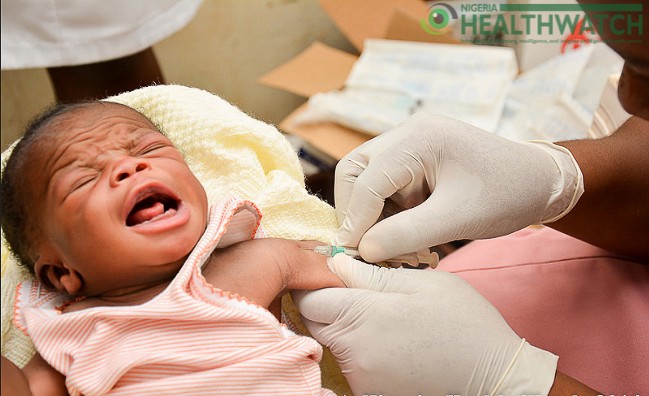“I know that immunisation is important and obviously I want the best for my child, but the schedules are quite confusing, especially as I do not have anyone explain what the different ‘drugs’ are for. The nurses are too busy to answer my questions or remind me when to come for the immunisation after I’ve put to bed.” Beatrice, Abuja
“I don’t trust these vaccines o! I don’t know what they put in them. After my neighbour’s daughter was vaccinated at six weeks, she fell sick for a week. The nurse just told her to go, that it is normal, how can sickness be normal? That’s why I decided not to continue with the vaccination.” Tolu, Abuja.
These sentiments commonly heard among poorly informed mothers may provide a clue as to why only 23% of Nigerian children aged 12 -23 months had received all vaccinations recommended in the national immunisation schedule by their first birthday.
Immunisation remains the most effective strategy for the prevention and control of common childhood diseases. It is also one of the most cost-effective public health interventions, in resource poor settings. In developing countries, immunisation programmes prevent approximately two million deaths per year, from diseases such as measles, neonatal tetanus, and whooping cough.


IMAGE CREDIT: NIGERIA HEALTH WATCH
The Global Immunisation Vision and Strategy (GIVS) 2006-2015, for fighting Vaccine-Preventable Diseases (VPDs) has three priority objectives: to immunise more people against more diseases; to introduce a range of newly available vaccines and technologies, and to provide a number of critical health interventions through immunisation. Nigeria is lagging in its attainment of all three objectives as immunisation coverage has remained low over the years and the time has come to take collective responsibility about this.
In Nigeria, the National Immunisation Schedule recommends that a child should receive four doses of Oral Polio Vaccine (OPV), three doses of Hepatitis B Vaccine, three doses of Diphtheria, Pertussis and Tetanus (DPT) vaccine and one dose each of Bacille Calmette – Guerin (BCG) against severe forms of tuberculosis, measles and yellow fever vaccines. Yet, Nigeria’s child’s immunisation coverage has remained low over the past decade, with only 1 in 4 children in the country receiving all the recommended vaccines as at 2016/2017. There has been a drastic decrease in full routine immunisation coverage, from the 1990 record high of 81.5%, to 23% in 2017 according to the National Multiple Indicator Cluster survey. However, this level of coverage varies across the country, with some states doing far worse.

In addition, Nigeria’s reluctant introduction of newly available vaccines and technologies may be another contributory factor to the poor immunisation coverage. Since the commencement of the Expanded Programme on Immunisation (EPI) in Nigeria in 1979, a very limited number of ‘new’ vaccines have been added to the initial basic recommended number. The Hepatitis B vaccine was introduced into the country’s routine immunisation schedule in 2004, 22 years after the vaccine became available in the global market in 1982. The Haemophilus Influenza B vaccine often called Hib vaccine, which became available in 1987 was only introduced in Nigeria in 2012 – 25 years later. Nigeria is the 45th out of 46 countries in the WHO African region to introduce the Hib vaccine (only before Guinea Bissau). Obviously, the pace of expansion is too slow in comparison to child morbidity and mortality rates. Alice recommends that the government encourage indigenous production of vaccines to reduce cost and increase supply.
In making the case for immunisation as the best-buy for Nigeria, there are strategies that can be implemented to improve the national immunisation coverage. Consistent and regular immunisation drives at the community level, is an active approach that could significantly increase the number of children immunised in Nigeria. We need to communicate and celebrate the benefits of immunisation with every child that survives to adulthood. Experience from many other health interventions have shown that, the most successful approaches are usually community-driven with significant community engagement and leadership. Like most community-driven strategies, availability of the right information, at the right time and to the right people is paramount for success.


IMAGE CREDIT: NPHCDA
However, healthcare workers need to be trained specifically to do this. They are uniquely positioned to influence parental decisions on childhood immunisation. The training of health workers needs to strongly address interpersonal communication skills, so that health workers can maximise various opportunities for reinforcement on immunisation and more generally on child health. Such training can help to ensure that health workers provide relevant and comprehensible information in a respectful and culturally sensitive manner.


WE NEED TO COMMUNICATE AND CELEBRATE THE BENEFITS OF IMMUNISATION WITH EVERY CHILD THAT SURVIVES TO ADULTHOOD. PHOTO CREDIT: NIGERIA HEALTH WATCH
Every healthcare worker should be mobilised for this irrespective of the level that they work in. Every single healthcare worker should be familiar with the immunisation schedules. Information about Nigeria’s recommended immunisation cycle and why it is important should be readily available in easy to read materials for both health workers and patients, in local languages where necessary. This messaging should emphasise that a child is not immunised until the immunisation cycle is complete.
Routine immunisation is cost-effective as it prevents the costs of treating many childhood illnesses. Importantly, it saves lives. Hand in hand, these two central messages should be the driving force behind promoting immunisation as a best-buy when it comes to child health and development in Nigeria.



Thanks for this article Dara!
While the above NPHCDA schedule is helpful, a more complete graphic/ infographic will be great for dissemination via social media or even in person to patients.
For instance, this easy to read printout from the US CDC can be stuck on a fridge and understood easily: https://www.cdc.gov/vaccines/parents/downloads/parent-ver-sch-0-6yrs.pdf
Perhaps Nigeria Health Watch can create something similar?